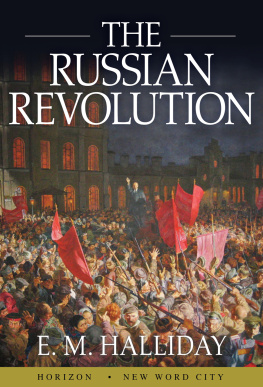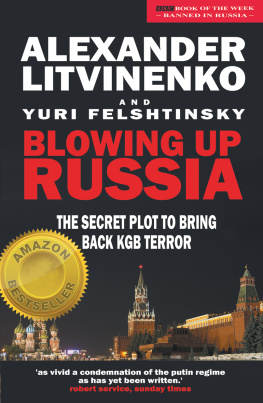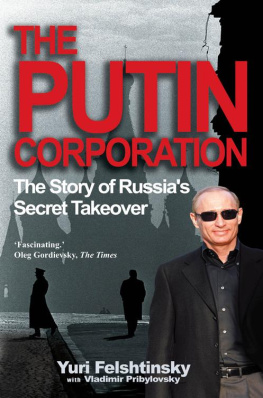Enigma Books
Also published by Enigma Books
Hitlers Table Talk: 19411944
In Stalins Secret Service
Hitler and Mussolini: The Secret Meetings
The Jews in Fascist Italy: A History
The Man Behind the Rosenbergs
Roosevelt and Hopkins: An Intimate History
Secret Affairs: FDR, Cordell Hull, and Sumner Welles
Hitler and His Generals: Military Conferences 19421945
Stalin and the Jews: The Red Book
Fighting the Nazis: French Intelligence and Counterintelligence
A Death in Washington: Walter G. Krivitsky and the Stalin Terror
The Battle of the Casbah: Terrorism and Counterterrorism in Algeria 19551957
Hitlers Second Book: The Unpublished Sequel to Mein Kampf
At Napoleons Side in Russia: The Classic Eyewitness Account
The Atlantic Wall: Hitlers Defenses for D-Day
France and the Nazi Threat: The Collapse of French Diplomacy 19321939
Mussolini: The Secrets of His Death
Mortal Crimes: Soviet Penetration of the Manhattan Project
Top Nazi: Karl WolffThe Man Between Hitler and Himmler
Empire on the Adriatic: Mussolinis Conquest of Yugoslavia
The Origins of the War of 1914 (3-volume set)
Hitlers Foreign Policy: 19331939The Road to World War II
The Origins of Fascist Ideology 19181925
Max Corvo: OSS Italy 19421945
Hitlers Contract: The Secret History of the Italian Edition of Mein Kampf
Secret Intelligence and the Holocaust
Balkan Inferno: Betrayal, War, and Intervention, 19902005
Calculated Risk
The Murder of Maxim Gorky
The Kravchenko Case: One Mans War On Stalin
Operation Neptune
Paris Weekend
Hitlers Gift to France
The Nazi Party: A Complete History
Encyclopedia of Cold War Espionage, Spies, and Secret Operations
The Cicero Spy Affair
NOC
The First Iraq War
Becoming Winston Churchill
Hitlers Intelligence Chief
Salazar: A Political Biography
Yuri Felshtinsky
Lenin and His Comrades
Enigma Books
All rights reserved under the
International and Pan-American
Copyright Conventions.
Published by Enigma Books, New York
Copyright 2010 by Enigma Books
No part of this publication may be reproduced, stored in a retrieval system, or transmitted, in any form or by any means, electronic, mechanical, photocopying, recording, or otherwise without the written permission of Enigma Books.
Publishers Cataloging-In-Publication Data
Fel'shtinski, IUri, 1956-
Lenin and his comrades / Yuri Felshtinsky.
p. : ill. ; cm.
Includes bibliographical references and index.
ISBN: 978-1-936274-15-4 (eBook)
1. Lenin, Vladimir Ilich, 1870-1924. 2. Communist International--History. 3. Soviet Union--History--Revolution, 1917-1921. 4. Russia--Politics and government--1894-1917. 5. Communism--Soviet Union--History. I. Title.
DK265 .F45 2010
947.0841
Contents
Lenin and His Comrades
T he history of the revolutionary movement in Russia was never elegant. It was not a history of starched collars, white gloves, and polished shoes. It was a history of dirt mixed with blood. There are many different kinds of historypolitical, social, economic, diplomatic, military, and cultural. Many excellent books have been written about all of these subjects, both in Russia and elsewhere.
But Russiawhich an American president once called the evil empire, a label that the government of Gorbachev and Yeltsin came to agree withalso had a different kind of history, namely, a criminal history. That part of the past is the subject of this book. It focuses on the criminal side of the interactions and working methods of the Bolshevik leaders during the first quarter of the twentieth century. The Bolsheviks carried out expropriations prior to the Revolution to finance it; they murdered the millionaires Savva Morozov and Nikolai Shmidt to seize their inheritances; and they entered into mercenary collaborations with foreign intelligence services and governments that were hostile to Russia. At Lenins urging the Soviet government signed a separate peace with Kaiser Wilhelm I in 1918 sabotage the revolution in Germany. The enemies of Lenins Treaty of Brest-Litovskmost importantly Felix Dzerzhinsky, the head of Russias security services, the Chekaorganized the assassination of the German ambassador Count Mirbach in order to provoke Germany into breaking the treaty; and how Lenin, Trotsky, and Sverdlov used Mirbachs murder to destroy the Left Socialist Revolutionary Party and establish a single-party dictatorship in Russia. After the attempt to undermine the Treaty of Brest-Litovsk failed, it is our thesis that Dzerzhinsky and Yakov Sverdlov, the de facto general secretary of the party, organized an assassination attempt against Lenin on August 30, 1918 (the so-called Kaplan assassination attempt), during which Lenin was wounded; and that Sverdlovs subsequent sudden death in March 1919 was not accidental, but may have been an act of revenge for his role in organizing the attempt. The murders of the heads of the German communist movementLiebknecht and Luxemburgin Germany: the theory supported here is that Karl Radek, a prominent Russian Bolshevik who was in Germany at this time, may have been involved in the murders of Liebknecht and Luxemburg. Beginning in 1922, Lenin was gradually ousted from power by Stalin and Dzerzhinsky, and as a result of this power struggle within the party he was murdered by them; and after which Trotsky was shunted aside, while Dzerzhinsky, Sklyansky, and Frunzeother prominent Bolshevikswere eliminated. The leadership of the Bolshevik Party bore a striking resemblance to an organized crime group. Almost none of its members died of natural causes. And almost all the Soviet leaders of Stalins generation, including Stalin himself, were done away with, in one way or another.
This book is based on wide-ranging sources, including both published and archival materials. Detailed references to these sources are given at the end of every chapter.
W hen people talk about the Russian Revolution, the name that usually comes up first is that of Vladimir Ilyich Lenin. So let us honor this tradition and also begin with Lenin. So much has been said and written about him that truth and fiction, myth and anecdote, fantasy and reality, have long become confused in a torrent of information. Meanwhile, this political figurewho was to play a fateful role in Russian historyhas remained concealed under countless cultural layers that have covered him in recent decades. The cult of Lenins personality, which was originally created by his collaborators and followers for their own convenience and promotion, has never been formally debunked. He still stands on a political pedestal and knocking him down is no simple matter.
Next page










